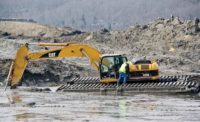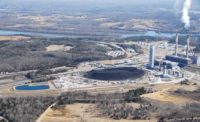The Trump administration has finalized changes to coal-ash storage regulations that give power utilities six more months, until April 11, 2021, before they must stop sending residue from coal-fired power plants to unlined, and often leaking, storage ponds.
The actions, taken by the U.S. Environmental Protection Agency, also allow utilities more time to permanently close existing unlined impoundments.
EPA said it reviewed engineering and construction data and found that not all utilities would be able to meet the 2020 deadline to stop taking waste in unlined pits and allow them to request extensions.
EPA’s action, announced July 29, is the first of five changes the agency expects to make to coal-ash storage regulations issued in 2015 by the Obama administration.
“Today’s action makes changes to the closure regulations for coal-ash storage that enhance protections for public health while giving electric utilities enough time to retrofit or replace unlined impoundment ponds,” EPA Administrator Andrew Wheeler said in a statement.
Environmental groups disagree with Wheeler’s assessment. “The rollback will add exemptions and loopholes that allow utilities to postpone closure of coal-ash ponds until as late as 2038,” the nonprofit environmental law organization Earthjustice said in a statement.
Utilities would have stopped adding toxic coal ash to the ponds more than a year ago if the administration had not stepped in to rescind the 2015 rule, said Lisa Evans, an Earthjustice attorney.
Earthjustice and the Sierra Club have vowed to fight the EPA regulatory changes in court.
The Obama administration published regulations in 2015 after two major spills from storage ponds. An unlined surface impoundment at a Tennessee Valley Authority coal-fired plant ruptured in 2008 and sent more than 1 billion gallons of coal ash, which had been stored as a slurry, across 300 acres and into a nearby river.
In 2014, a Duke Energy impoundment spilled 39,000 gallons of coal ash and 27,000 gallons of wastewater into the Dan River. The coal waste is known to contain arsenic, lead, mercury, chromium and other toxic substances.
The rollback delays the closing of leaking coal-ash ponds located in dangerous areas, said Mary Ann Hitt, the Sierra Club’s director of campaigns.
According to EPA, about 85% of the storage impoundments are located in three areas of the U.S.: the Midwest, with 41%; the Southwest, with 10%; and the Southeast, with 34%.
Utilities in the Southeast have stopped sending ash to unlined impoundments and most of the unlined pits are being dug out, Frank Hollaman, an attorney with the Southern Environmental Law Center, told ENR.
“This rule is meant for the poorest performers, most irresponsible and most polluting utilities in the country,” Hollaman says. The one improvement that EPA’s rule makes is that clay lined pits are now considered unlined and must be retrofitted or closed, he adds.



